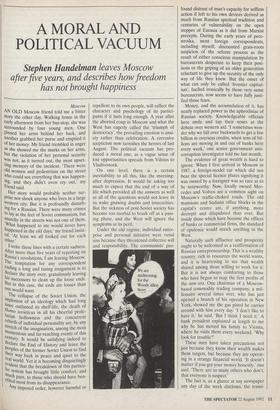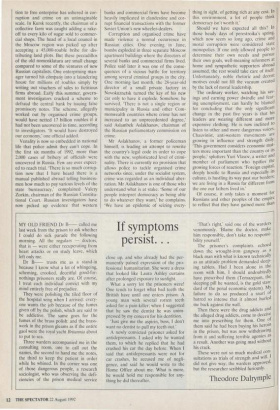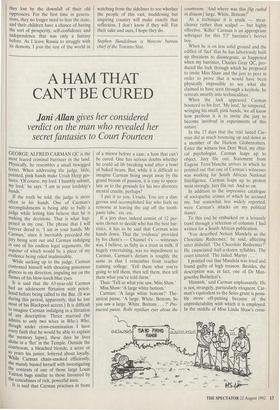A MORAL AND POLITICAL VACUUM
Stephen Handelman leaves Moscow
after five years, and describes how freedom has not brought happiness
Moscow AN OLD Moscow friend told me a bitter story the other day. Walking home in the early afternoon from her bus-stop, she was surrounded by four young men. One pinned her arms behind her back, and another grabbed her purse and emptied it of her money. My friend trembled in anger as she showed me the marks on her arms, but the violation of her personal security was not, as it turned out, the most upset- ting memory of the incident. 'There were old women and pedestrians on the street who could see everything that was happen- ing, and they didn't even cry out,' my friend said.
Her story would probably neither sur- prise nor shock anyone who lives in a large western city. But it is profoundly disturb- ing for a Russian. There were many crimes to lay at the feet of Soviet communism, but anarchy in the streets was not one of them. `What happened to me would never have happened in the old days,' my friend insist- ed. 'At least we all looked out for each other.'
I write these lines with a certain sadness. After more than five years of reporting on Russia's revolutions, I am leaving Moscow. ,
' no temptation for any correspondent ending a long and taxing assignment is to declare the story over, gratuitously leaving his successors to clean up the loose ends. But in this case, the ends are looser than °ne would want.
The collapse of the Soviet Union, the implosion of an ideology which had long since outlasted its shelf-life, the death of ilonto sovieticus in all his cheerful prole- tarian hollowness and the concurrent rebirth of individual personality are, by any stretch of the imagination, among the most Momentous and far-reaching events of this century. It would be satisfying indeed to declare the End of History and leave the Peoples of the former Soviet Union to find their way back in peace and quiet to the real world. Yet it is becoming disquietingly evident that the breakdown of this particu- lar system has brought little comfort, and flinch pain, to those who should have ben- efited most from its disappearance. Any imposed order, however harmful or
repellent to its own people, will reflect the character and psychology of its partici- pants if it lasts long enough. A year after the aborted coup in Moscow and what the West has eagerly called the 'triumph of democracy', the prevailing emotion is anxi- ety rather than celebration. A corrosive scepticism now tarnishes the heroes of last August. The political vacuum has pro- duced a moral one, as a vague sense of lost opportunities spreads from Vilnius to Vladivostock.
On one level, there is a certain inevitability to all this, like the morning- after depression. It would be asking too much to expect that the end of a way of life which provided all the answers as well as all of the questions would not leave in its wake gnawing doubts and insecurities. But the sickness of post-Soviet society has become too morbid to brush off as a pass- ing phase, and the West will ignore the symptoms at its peril.
Under the old regime, individual enter- prise and personal initiative were venal sins because they threatened collective will and responsibility. The communists' pro- found distrust of man's capacity for selfless action if left to his own devices derived as much from Russian spiritual tradition and centuries of vulnerability on the open steppes of Eurasia as it did from Marxist precepts. During the early years of pere- stroika, most foreign correspondents, including myself, discounted grass-roots suspicion of the reform process as the result of either conscious manipulation by bureaucrats desperate to keep their posi- tions or the griping of an older generation reluctant to give up the security of the only way of life they knew. But the onset of what can only be called 'frontier capital- ism', fuelled ironically by those very same bureaucrats, now seems to have fully justi- fied those fears.
Money, and the accumulation of it, has neatly replaced power as the aphrodisiac of Russian society. Knowledgeable officials here smile and tap their noses at the debate over western aid. 'I sometimes won- der why we fall over backwards to get a few billion in overseas credits, when tens of bil- lions are moving in and out of banks here every week,' one senior government anti- corruption investigator told me last month.
The evidence of great wealth is hard to ignore. When I first arrived in Moscow in 1987, a foreign-model car which did not bear the special licence plates signifying it was owned by a foreigner was so rare as to be noteworthy. Now, locally owned Mer- cedes and Volvos are a common sight on Moscow's traffic-choked roads. The old mansions and Stalinist office blocks in the capital's centre are, if anything, more decrepit and dilapidated than ever. But inside those which have become the offices of banks or commercial firms, the standard of opulence would match anything in the West.
Naturally such affluence and prosperity ought to be welcomed as a reaffirmation of Russian entrepreneurship. This is a wealthy country, rich in resources the world wants, and it is heartening to see that wealth shared among those willing to work for it. But it is not always comforting to those who have begun to reap the first profits of the new era. One chairman of a Moscow- based commodity trading company, a mil- lionaire several times over, who has just opened a branch of his operation in New York, showed me the gas pistol he carries around with him every day. 'I don't like to have it,' he said, 'But I think I need it.' A bank president explained at length to me why he has moved his family to Vienna, where he visits them every weekend. 'Why look for trouble?'
These men have taken precautions not just because they know their wealth makes them targets, but because they are operat- ing in a strange financial world. 'It doesn't matter if you get your money honestly,' one said. 'There are so many others who don't, that everyone is suspect.'
The fact is, as a glance at any newspaper any day of the week discloses, the transi- tion to free enterprise has ushered in cor- ruption and crime on an unimaginable scale. In Kursk recently, the chairman of a collective farm was caught adding a rake- off to every kilo of sugar sold to commer- cial shops. The head of a local council in the Moscow region was picked up after accepting a 45,000-rouble bribe for dis- tributing land plots. But these peccadillos of the old riomenklatura are small change compared to some of the ventures of new Russian capitalists. One enterprising man- ager turned company into a latindering house for millions of roubles simply by writing out vouchers of sales to fictitious firms abroad. Early this, summer, govern- ment investigators cracked a scheme to defraud the central hank by issuing false promissory notes. The scheme, allegedly worked out by organised crime groups, would have netted 17 billion roubles if it had not been uncovered in time, according to investigators. 'It would have destroyed our economy,' one official added.
Venality is now so embedded in national life that police admit they can't cope. In the first six months of 1992, more than 2,000 cases of bribery of officials were uncovered in Russia. Few are ever expect- ed to reach trial. 'There is so much corrup- tion now that I have heard there is a manual published abroad telling business- men how much to pay various levels of the state bureaucracy,' complained Valery Zorkin, chairman of the Russian Constitu- tional Court. Russian investigators have now picked up evidence that western banks and commercial firms have become heavily implicated in clandestine and cor- rupt financial transactions with the former Soviet Union's new wheeler-dealers.
Corruption and organised crime have made violence a normal occurrence in Russian cities. One evening in June, bombs exploded in three separate Moscow apartment buildings where the directors of several banks and commercial firms lived. Police said later it was one of the conse- quences of a vicious battle for territory among several criminal groups in the city. One morning last month, the 28-year-old director of a small private factory in Novokuznetsk turned• the key of his new car only to have it explode. Somehow, he survived. 'There is not a single region or municipality in Russia and other Com- monwealth countries where crime has not increased to an unprecedented degree,' said Aslambek Aslakhanov, chairman of the Russian parliamentary commission on crime.
Mr Aslakhanov, a former policeman himself, is leading an attempt to rewrite the country's legal code in order to cope with the new, sophisticated level of crimi- nality. There is currently no provision that allows police to tackle organised crime networks since, under the socialist system, crime was regarded as an individual aber- ration. Mr Aslakhanov is one of those who understand what is at stake. 'Some of our people interpret democracy as being able to do whatever they want,' he complains. `We have an epidemic of seizing every-
thing in sight, of getting rich at any cost. In this environment, a lot of people think democracy isn't worth it.' Should we have expected all this? In those heady days of perestroika's spring, which now seem so long ago, crime and moral corruption were considered state monopolies. If one only allowed people to determine their own needs and pursue their own goals, well-meaning reformers at home and sympathetic supporters abroad assumed, the rest would take care of itself. Unfortunately, noble rhetoric and decent motives could not fill the vacuum created by the lack of moral leadership.
The ordinary worker, watching his sav- ings and earning power dwindle and fear- ing unemployment, can hardly be blamed for concluding that the only significant change in the past five years is that his leaders are wearing different and more expensive clothing. He is now inclined to listen to other and more dangerous voices. Chauvinist, anti-western movements are growing in influence and strength daily. `This government considers economic mat- ters more important than the country or its people,' splutters Yuri Vlasov, a writer and member of parliament who typifies the growing forces of reaction. 'Foreign capital, deeply hostile to Russia and especially its culture, is hustling its way past our borders; we are living in a Russia far different from the one our fathers lived in.'
Of course, it only takes a moment for Russians and other peoples of the empire to reflect that they have gained more than they lost by the downfall of their old oppressors. For the first time in genera- tions, they no longer need to fear the state, and their children have a chance of having the sort of prosperity, self-confidence and independence that was only a fantasy before. As I leave Russia to struggle with its demons, I join the rest of the world in watching from the sidelines to see whether the people of this vast, maddening but inspiring country will make exactly that reflection. I don't know if they will. For their sake and ours, I hope they do.
Stephen Handelman is Moscow bureau chief of the Toronto Star.












































 Previous page
Previous page